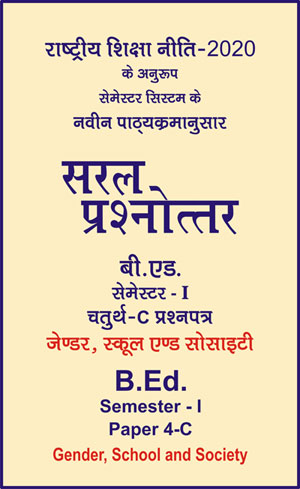|
बी एड - एम एड >> बी.एड. सेमेस्टर-1 प्रश्नपत्र-IV-C - जेण्डर, स्कूल एण्ड सोसाइटी बी.एड. सेमेस्टर-1 प्रश्नपत्र-IV-C - जेण्डर, स्कूल एण्ड सोसाइटीसरल प्रश्नोत्तर समूह
|
|
||||||
बी.एड. सेमेस्टर-1 प्रश्नपत्र-IV-C - जेण्डर, स्कूल एण्ड सोसाइटी (अंग्रेजी भाषाा में)
Question- How do caste discrimination and stereotypes affect politics?
Answer -
Caste discrimination and stereotypes affect politics in the following way:
When the parties decide the names of the candidates for the election, they keep in mind the castes of the voters of the constituency so that they get the necessary votes to win the elections. When the government is formed, political parties take care that people belonging to different castes and tribes are given proper place in it.
Political parties and candidates incite caste sentiments to gain support. Some parties are seen as helpers and representatives of certain castes.
Universal adult suffrage and the system of one man-one vote forced political parties to be active in seeking political support and mobilizing people. This created a new consciousness among the people of those castes which were till now considered small and low.
The emphasis on caste in politics can sometimes lead to the impression that elections are a game of castes, nothing more. This is not true. Just consider these things :
There is no majority of the people of any one caste in any one parliamentary constituency of the country, so every party and candidate has to get the trust of more than one caste and one community to win the election.
No party can get the votes of all the people of any one caste or community. When people call a particular caste the ‘vote bank’ of a party, it means that most of the people of that caste vote for that party.
If a constituency is believed to be dominated by people of one caste, then no one can stop many parties from fielding candidates of the same caste. In such a situation, in front of some voters, there is more than one candidate of their caste, while in front of the voters of any caste, there is not a single candidate of their caste.
In our country, the ruling party, sitting MPs and MLAs often face defeat. This would not have been possible if the political preferences of castes and communities were the same.
It is clear that the role of caste in elections is important, but other factors are equally effective. Voters often have a deeper affiliation with political parties than they do with their castes. Even within a caste or community, the interests of the rich and the poor are different. Rich and poor people of the same community often vote for different parties. Public opinion about the functioning of the government and the popularity of leaders often have a decisive influence on elections.
|
|||||

 i
i 









